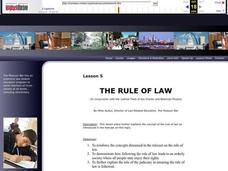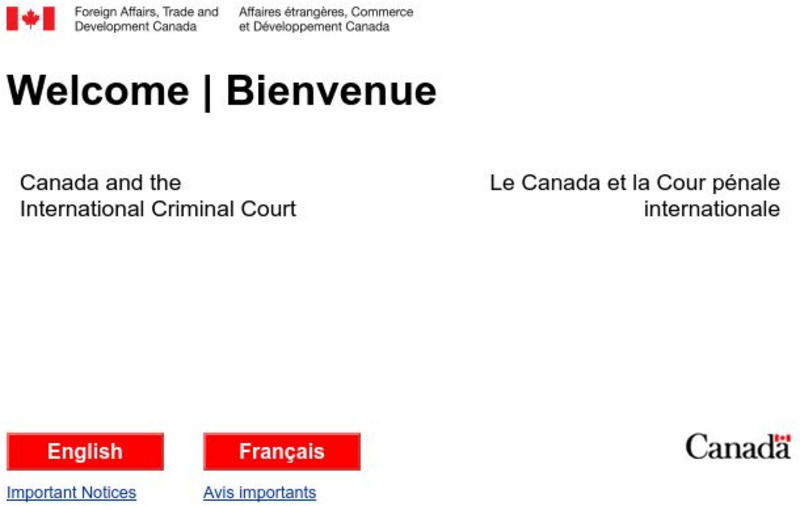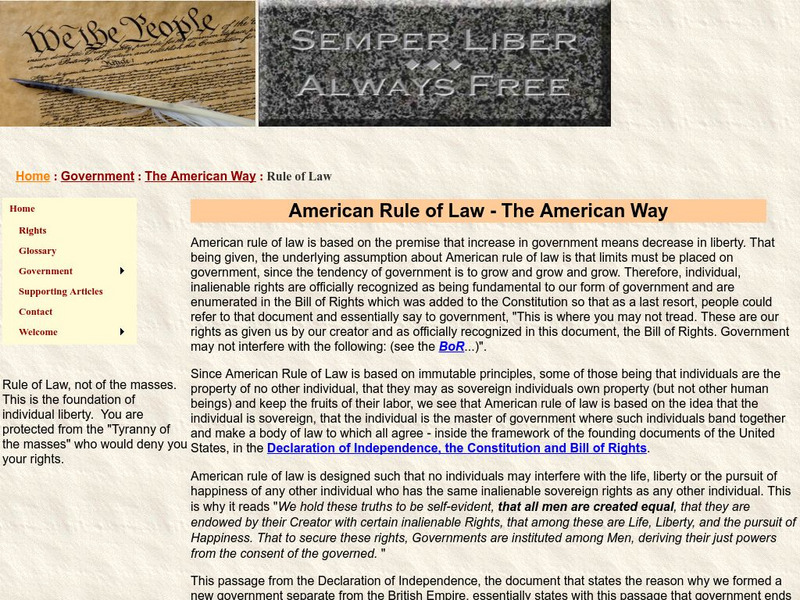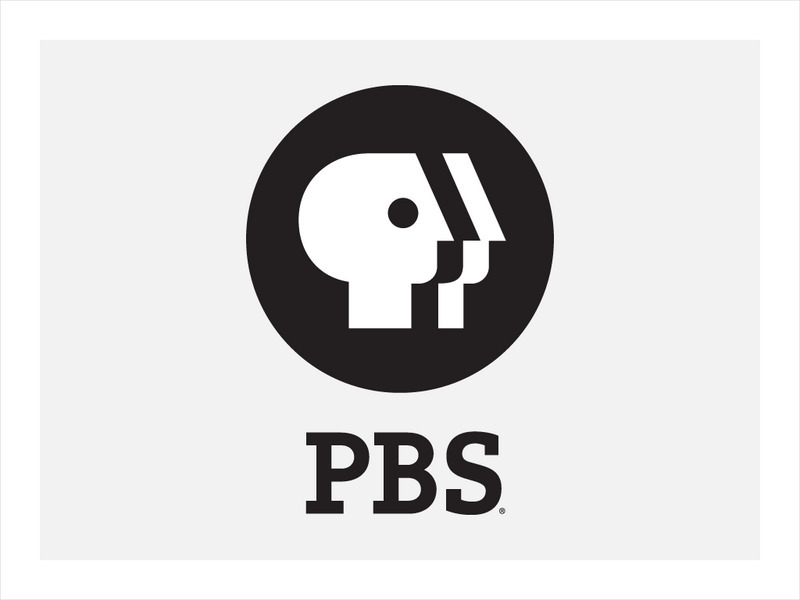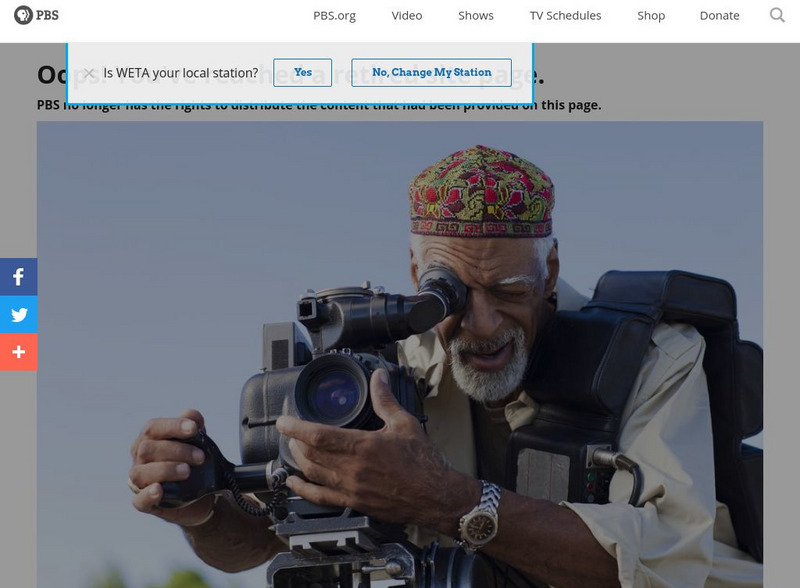iCivics
Limiting Government
While this lesson includes several nice worksheets to identify and discuss the various limits on government (i.e. a constitution, the rule of law, separation of powers, consent of the governed, etc.), its main value lies in a case study...
Curated OER
The Rule of Law
Learners review the concept of rule of law. They discuss how the rule of law can give society a positive view. They explore the role of the judiciary as well.
Curated OER
The Rule of Law
Students continue their exploration of the concept of rule of law. As a class, they discuss how Civil Rights leaders followed the rule of law in their protests. After reading various articles, they participate in a discussion and...
Curated OER
Will the Real Capitalism Please Stand Up?
Young scholars analyze descriptions from five different countries to determine which institutional components of capitalism are present and, if so, to what extent. They then place each on a continuum depending upon the number and...
Curated OER
Branches of Government Worksheet
This is a basic multiple choice activity. Learners answer a set of 9 multiple choice questions about early colonists and branches of government. You might use this as a check for understanding or a quick quiz. The first 2 questions are...
Curated OER
A Message of Ancient Days
Young scholars closely examine several of Hammurabi's laws and compare them to laws and/or values we use today. They consider how laws are made and enforced and complete several worksheets during their investigations.
Other
Canada and the International Criminal Court
A comprehensive website from the Canadian Government FAIT Department detailing the nation's involvement in the International Criminal Court in The Hague, Netherlands. Lists important topics, news, history and other relevant information,...
iCivics
I Civics: The Constitution: Rules for Running a Country
Handy introduction to the Constitution of the United States, which has been our government's rulebook since 1789.
iCivics
I Civics: Colonial Influences
Where did the American colonists get their ideas that lead to a revolution and a whole new kind of government? This lesson explores the Magna Carta, Mayflower Compact, English Bill of Rights, Cato's Letters, and Common Sense.
iCivics
I Civics: Constitutional Principles
The Founding Fathers created a government based on a set of fundamental principles carefully designed to guarantee liberty. This lesson lets students look at the Constitution from the perspective of its foundational principles and make...
Center For Civic Education
Center for Civic Education: George Washington's Legacy to America
This lesson plan from the Center for Civic Education encourages both teachers and students to learn more about George Washington's contribution to American Constitutionalism and Citizenship.
Digital History
Digital History: American Revolution: Introduction
The American Revolution included so much more than just the War for Independence. Read about why it was the first modern revolution and discover the principles that the American revolutionaries were fighting for.
Digital History
Digital History: How Revolutionary Was the American Revolution?
How did the American Revolution reflect a change in American society? Read about how political participation increased across the classes, and see how the question of slavery and women's rights became a thorn in the side of those...
iCivics
I Civics: Rule of Law
Students learn about the rule of law and how it protects individual rights and freedoms. By performing short, scripted skits that illustrate what life might be like without the rule of law, students identify six factors that make up the...
Other
Semper Liber: American Rule of Law the American Way
American rule of law is based on the premise that increase in government means decrease in liberty. That being given, the underlying assumption about American rule of law is that limits must be placed on government, since the tendency of...
Independence Hall Association
U.s. History: The Bill of Rights
The Constitution spelled out the powers of the national government, but many Anti-federalists felt there should be equally explicit a guarantee of individual rights. Read about the compiliation of what became known as the Bill of Rights...
Bill of Rights Institute
Bill of Rights Institute: Constitutional Principles
James Madison knew that a key challenge of maintaining just government was framing it in such a way that the government would be forced to control itself. How does a system of separated powers-and the checks and balances built into those...
Other
World Justice Project: What Is the Rule of Law?
Derived from internationally accepted standards, the World Justice Project's definition of the rule of law is a system in which the following four universal principles are upheld by four universal principles. These four universal...
PBS
Pbs Learning Media: Magna Carta: Rule of Law
Learn how the rule of law and due process, first guaranteed by Magna Carta, became an essential component in U.S. constitutional law in this video with supporting materials. [1:11]
iCivics
I Civics: Limiting Government
Explore the five basic limits on government through the true story of Peruvian president Alberto Fujimori, and other fictional cases of government power gone wild.
PBS
Pbs: Core Values of American Constitutional Democracy
A list of terms presented by PBS and Newshour of the values that make up the foundation of American constitutional democracy and the preservation of political and economic freedoms.
PBS
Pbs Teachers: George Washington and the Rule of Law (Lesson Plan)
A lesson that supports an examination of George Washington's commitment to the principle of the rule of law by looking at specific situations faced by Washington in which he chose the rule of law over expediency or personal power.



